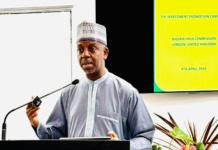Nigeria has become Africa’s largest economy and most populous nation recently after experiencing large GDP growth between 2005 and 2014 due to high global oil prices. Unfortunately this growth is now threatened by the rapid decline in the value of the Naira, decreasing oil prices and foreign capital inflows falling 74%.

This is part of the reason why the country’s infrastructure needs to improve. A good infrastructure will not only provide a better quality of life to the people of Nigeria but it will also mean that the country’s economy will flourish as time goes on.
The new administration of Nigeria’s President Buhari is placing priority in infrastructure to meet developmental challenges as the country is poised to be the third largest in population by 2050. In the quest to plug the infrastructure gap, the Nigeria Infrastructure Advisory Facility, the UK’s Department for International Development’s project implemented by Adam Smith international support Nigeria in planning, prioritising and reforms in power and other sectors.
Adam Smith International is a global award-winning facility development firm, its facilities are among the DFID’s most successful infrastructure programmes. Adam Smith International works with many countries; Nigeria is one of those countries. Adam Smith International works with Nigeria in many aspects, one example is that they provide technical, organisational, financial and legal assistance to Nigeria’s electricity sector. This relationship between Adam Smith International and Nigeria meant that Nigeria could prosper more as a nation. A few examples of the benefits of this relationship are that Nigeria’s power output has risen 60% from 2008 to 2015, a robust and transparent road management framework has been established and the advisors of Adam Smith International have helped the government develop $3 billion of infrastructure projects in Lagos alone.
On Friday 29th July, Mr Babatunde Raji Fashola – Minister of Power, Works and Housing of the Federal Republic of Nigeria was a distinguished guest at the Adam Smith International’s headquarters in central London where a conference was held to discuss ideas and approaches with senior individuals from the UK for improved managing and delivering results from investment in infrastructure in Nigeria and the UK. It was an opportunity for minister Fashola to present to stakeholders his infrastructure roadmap for change in power, works and housing sectors. Speaking prior to the event, Mr Fashola said: “When you look at economies like the US, you can’t talk about the prosperity of their economy without talking about those who built the foundations of their economy- who built the first rail lines, the steel plants and other large projects. I am now beginning to see that generation of Nigerians beginning to emerge, funding infrastructure, strategic national assets and venturing into entrepreneurship.” “Power is the real business now that everybody is interested and once Nigerian’s are interested in doing something they don’t lose, they don’t give up.”
Mr Fashola spoke about how Nigeria’s infrastructure hasn’t changed much in the past couple of decades, saying: “Between the early decade 1980-1990 when Jebba and Egbin Power Plants were built by the Buhari and Babangida governments, no major power plant was commenced until early 2000, a period of over a decade and a half. But during that period, our population exploded in leaps and bounds. But a lot of that is in the distant past. Year 2000 is 16 years ago.” He also talks of how an increased relationship between the UK and Nigeria could benefit both countries, he said “The Nigerian market is bigger than what it was in the 20th century. […] However, more needs to be done. There is increasing opportunity for private capital in Power, Roads, Housing and other public









